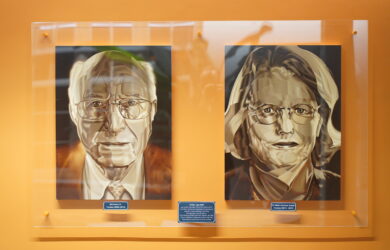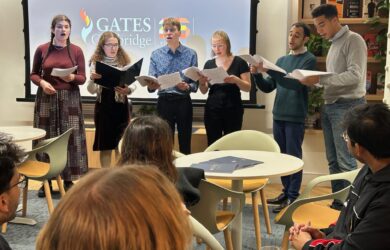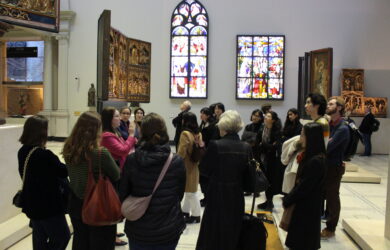
Rafi Kakar talks about how his experience of working in regional and national policymaking in Pakistan will inform his PhD.
I am interested in how the state can enforce formal rules when informal institutions and norms are so dominant and state legitimacy is weak.
Rafi Kakar
Rafi Kakar [2024] is keen to contribute to better public service delivery and development outcomes in Pakistan by employing a research approach that blends theory with the realities of public policymaking.
He believes that the devolution of social sectors to the provinces in 2010 has created both challenges and opportunities for governance reforms and improvements in sub-national state capacity. He says this is particularly true in smaller provinces, where a combination of colonial legacies, uneven state penetration, violent conflicts and the enduring influence of informal institutions have resulted in varied trajectories of state capacity and state-society relationships.
Having grown up in difficult circumstances along the Pakistan-Afghanistan border, education has been Rafi’s guiding light and he wants it to be used to help those from families like his to have a better life and more opportunities. He has always worked hard for what he wants and in the process has won some of the world’s most illustrious scholarships, from Fulbright to Rhodes and now to Gates Cambridge.
But academic achievement is not sufficient for Rafi unless it has real impact. For that reason he has spent years working on the ground on public policy issues, both regionally and nationally. He is currently the Member (Social Sector & Devolution) at the Planning Commission of Pakistan – the country’s premier economic planning and public investment management institution under the leadership of the Prime Minister. As the team lead for social sectors and science and technology, managing a cumulative budget of over PKR 800 billion, Rafi has been at the heart of the Planning Commission’s efforts to diagnose the systemic issues impeding effective public service delivery and formulate evidence-based policies, strategies and programmes for addressing these challenges.
His achievements include the stewardship of the Ministry’s flagship Young Development Fellows programme, contributions to the formulation of Pakistan’s medium-term development plan, the post-2022-flood rehabilitation and reconstruction strategy and the design and evaluation of flagship programmes and projects focusing on education and health reforms, skills development, youth empowerment, women’s mobility and regional equity.
He says his academic understanding of policy and development has been challenged by experiencing how things work on the ground, for instance, when it comes to the role played by informal norms and social structures to circumvent formal rules. “I am interested in how the state can enforce formal rules when informal institutions and norms are so dominant and state legitimacy is weak,” he says.
His learning from his involvement in policy formulation and implementation at the highest level has kindled a desire to delve deeper into the comparative politics of development.
His PhD in Education, which he begins in the autumn, will explore the political economy of sub-national state capacity through a comparative study of education policy in two Pakistani provinces: his own province of Balochistan and Khyber Pakhtunkhwa. Rafi, whose supervisor Professor Pauline Rose replied to his first inquiry within a few minutes of receiving it, says: “Despite a shared history and common social composition, these provinces exhibit differing capacities for improving education outcomes. Through a ‘political settlement analysis’, I aim to unravel and analyse the drivers behind this differential performance.”
Early childhood and schooling
Rafi’s passion for public service is intrinsically linked to his own experience of growing up in Balochistan, one of the most underdeveloped, conflict-riven parts of Pakistan.
Born in a small village along the Pakistan-Afghanistan border, Rafi was the ninth of 13 children. His father was a small farmer and his mother is a housewife. Neither had completed their primary education. The family owned apple and pomegranate orchards. Rafi attended a government primary school in the 1990s at the time the Taliban were emerging in Afghanistan. In his region – which he describes as ‘an almost ungoverned space’ – the Taliban were fairly popular and it was the norm for young people to cross the border to join them.
In Rafi’s village, Gulistan, violent tribal conflicts raged when he was growing up, although his family was never directly involved. They happened so often that big households like Rafi’s had an underground bunker where they could hide during the fighting and mortar exchanges between feuding tribes. Sometimes these would last for days and the school would be closed. Sometimes children would be sent to a relative’s house in another district for a few weeks. Several villagers were killed in the fighting and the region’s only public hospital, veterinary hospital and high school were permanently closed as a result of the feuding.
Rafi’s primary school was not in a proper building. The children had to sit on the ground on a mat. After Grade 5, he attended a government middle school which was a 30-minute walk away. He recalls the excitement of having desks to sit at and a school uniform. This was the time when Rafi’s elder brother was forced by economic circumstances to travel to the United Arab Emirates for work. In the UAE, his brother experienced how a lack of formal education held him back.
Although he had himself dropped out of secondary school, this awareness drove him, on his return to Pakistan, to single-handedly transform the fortunes of the younger members of his family through investing in their education. “It was a watershed moment in the life of younger members of our family” says Rafi. His elder brothers paid for tutoring and encouraged his younger siblings, cousins and other younger members of the family to study. At the age of 11, Rafi took a competitive entry exam and got into the Balochistan Residential College Loralai boarding school.
Rafi says his six years there represented the first major transformation in his life. He struggled for the first two years as he didn’t know English, the language of instruction. “I didn’t even know how to spell English,” he says. But he didn’t want to disappoint his brother so he set to work, using his pocket money to buy spoken English books. Once he got up to the same level as his fellow students, many of whom had been to private schools, he became one of the best-performing students. He also got involved in extracurricular activities such as sport, drama and debate club which helped to build his confidence and communication skills. And he became interested in politics as increasing political turbulence hit the region in the wake of 9/11.
When he finished school, Rafi was among the best students in his province and could have got into the top-ranked engineering universities in the country. He chose politics, economics and history and got a place at one of the best public sector universities, Government College University in Lahore. It was the first time he had travelled out of his area and he found the cultural diversity there stimulating, although he says he wasn’t academically challenged on the course. The worsening political situation in the country, including terrorist attacks in Lahore, meant he and other students from Balochistan at times experienced ethnic profiling and discrimination. “We were held accountable for the attacks as if we were responsible,” he says.
International exposure and experience
Being exposed to the cultural diversity of Pakistan gave Rafi the confidence and encouragement to aim higher. He found out about the Fulbright undergraduate scholarship programme by accident through another student and applied. The scholarship funded a semester in Augustana College in South Dakota where the conservative, patriarchal social norms he had grown up with in his region were challenged. Once again Rafi worked hard and his experience encouraged him to look at other study abroad opportunities and scholarships on his return to Pakistan. He spent months researching and honing the application process and getting good mentorship.
Having graduated as a gold medallist in Pakistan, Rafi started a masters course in Public Policy at Oxford University as a Rhodes Scholar in 2013. Rafi became the first student from Balochistan to study at the University of Oxford. When the news of the scholarship came through the entire province celebrated.
Rafi says he learned a lot from his peers on the master’s course who came from more than 60 countries. The first year was a culture shock and the course was fast-paced, but he enjoyed campus life, taking part in cricket and student politics. He then did a second master’s in Governance and Development and worked for two years in the policy and research unit at the Commonwealth Secretariat in London on its youth programme. There he was the lead researcher on the Global Youth Development Index and worked on youth entrepreneurship and political participation, visiting countries in sub-Saharan Africa and some Pacific islands. “It gave me an insight into the public sector in very different contexts,” he says.
Return to Pakistan
In 2017 Rafi took a ‘leap of faith’ and returned to Pakistan. He had been writing opinion pieces on politics and society in Pakistan while in the UK and a friend asked him why he didn’t return if he was so passionate about his country. It struck a chord. He got married on his return and he and his wife, a doctor from Balochistan, lived with Rafi’s family. Their presence as a working couple caused a big shift in the family’s status quo. Before that none of the women in the family had worked after marriage. It showed Rafi how difficult it is to change society and how much time and commitment is needed.
He is proud of the change that happened in his family culture and of how this allowed women more space. He describes it as a negotiation process and says he is very grateful both to his family and to his wife for how they have been willing to compromise. “It was a radical change, but my family has had the vision to accept it and reach a negotiated settlement with me. Our family is not the same as it used to be 10 years ago,” he says.
Rafi did some research work with international development organisations in Islamabad, but he soon realised that he wanted to work in government and be involved in formulation and implementation of policies as he sees this as crucial to durable political and social change. He joined the policy reforms unit at the government of Balochistan. He found it frustrating at times to get initiatives off the ground due to political inefficiencies and a poorly structured work environment, but he came to understand that the problems are not caused by individuals but by structural issues and that those outside government need to understand the limitations those in it are working under.
Rafi started over two dozen initiatives in his time in the regional government and hoped that even if only two or three initiatives were implemented, they will have an impact. As the head of the policy reforms unit, he built a good team around him. Together, they automated public investment management processes, designed data tools and spatial decision support system, developed policy papers and briefs for reforming public investment planning and institutional reforms, reviewed and rationalised Balochistan’s portfolio of projects under the China-Pakistan Economic Corridor and set up a legal and institutional framework for Public-Private partnership [PPP] initiatives for infrastructure development and service delivery. The first project to come out of this centred on public transport. Rafi is proud of how his team led the implementation of the province’s first-ever public transport project through a PPP plan, which is already delivering results.
In September 2022, Rafi moved to a role in the federal government, working in the Planning Commission. where he is the youngest Member to have ever worked there.
Gates Cambridge
Rafi, who was inspired by fellow Gates Cambridge Scholar Arif Naveed’s work, says he has spent five or six years thinking about the topic of his PhD and is passionate about it. He did not want to apply for a PhD until he was sure about the topic. “It will be informed by my practical experience and by my learnings and un-learnings,” he says, adding: “I have thought about this every month for years and have been reading more and more about it until I was sure. It took me a year and half to write my PhD proposal. If I want something I mean business!”
Rafi would like to return to Pakistan upon the completion of his PhD and contribute to public sector reforms and better governance.












